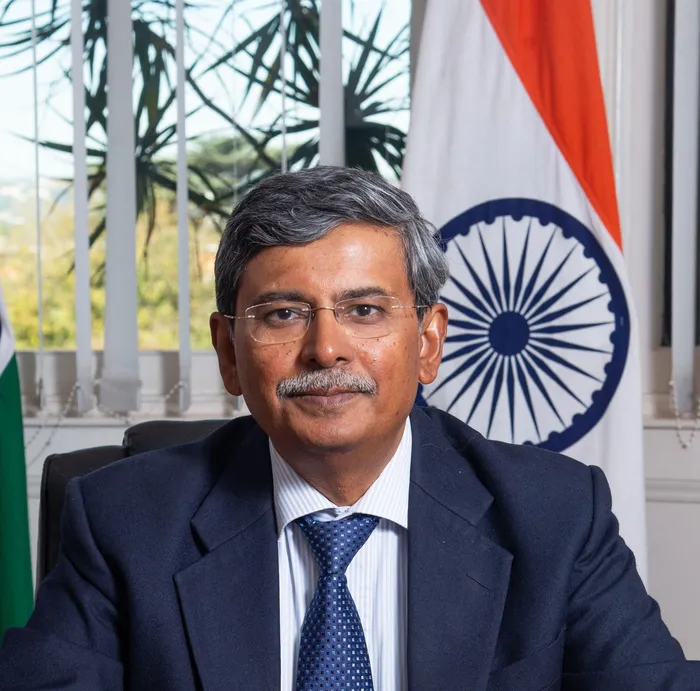
Prabhat Kumar, High Commissioner of India to South Africa and Lesotho
Image: Supplied
The G20 Summit scheduled to take place on 22nd-23rd November in Johannesburg is the high point of the yearlong presidency of South Africa of the group of nineteen countries and two continental unions, namely the African Union and European Union. South Africa’s presidency has been special, as it is the last in the series of the 4 countries of the Global South that have held the presidency in succession.
This has been a unique opportunity. Indonesia, India, Brazil, and South Africa have used their presidencies to bring the issues of the Global South to the forefront of the G20 agenda, thus making a big contribution in shaping the future direction of the grouping.
President Cyril Ramaphosa, at the launch of the South African G20 Presidency, rightly said, “We will use this moment to bring the development priorities of the African Continent and the Global South more firmly onto the agenda of the G20.
''In this regard, we will build on the work of the most recent G20 presidencies of Brazil in 2024, India in 2023, and Indonesia in 2022. We will use our G20 Presidency to secure urgent progress on shared goals through a number of priority actions.”
India, during its presidency of the G20 in 2023, worked with other countries of the Global South, especially the countries that are not members of the G20, to get their views on issues that affected these nations.
To achieve this, India invited countries to participate in two virtual ‘Voice of Global South Summits,’ thus creating an innovative platform, recommendations from which flowed into India's presidency. India’s presidency especially focused on inclusive growth, digital transformation, climate action, debt sustainability, strengthening multilateralism, and women’s empowerment. It also emphasised human-centric growth, going beyond the usual economic indicators such as GDP.
India also volunteered to share its expertise and initiatives in various areas with countries of the Global South. Speaking at the G20 Rio de Janeiro Summit in November 2024, Prime Minister Narendra Modi said, “India is sharing its successful initiative with the Global South on affordable finance and technology access.”
From launching the Global Biofuels Alliance and promoting ‘One Sun, One Earth, One Grid’ to planting a billion trees under ‘Ek Ped Maa ke Naam,’ we continue to work actively towards sustainable progress.” Brazil and South Africa have taken these issues forward in their own ways, thus making their presidencies successful not only in terms of what they achieved as a group but also in incorporating the agenda of developing countries in the decisions.
The African Union (AU) was admitted as a member of the G20 during India’s presidency, which was a major win for the Global South. The joining of AU, which comprises 55 countries of the African continent, has made G20 more broad-based, covering about 80% of the world population.
The hosting of the G20 presidency on the continent of Africa, following the admission of the AU to the G20, is important as it epitomises the growing stature of the African continent in world affairs. South Africa is hosting the G20 meetings, permeated with the African spirit of Ubuntu, which captures very well the need for solidarity between countries and people as ‘I am because we are’.
Reform of multilateral institutions has been emphasized in the decisions of the G-20. They should reflect the changes that have taken place in the world since their establishment, about 80 years ago. Both South Africa and India have stressed the need for UN reforms, especially of its Security Council, for a more equitable global order. Similarly, a more effective and representative international financial architecture and reforms in multilateral development banks will be essential to respond to the current realities.
When the summit adopts important decisions in its meeting on 22-23 November, 2025, it will have implications for the future of our people, and it will do so in consonance with the theme of the Indian presidency, ‘Vasudhaiva Kutumbakam,’ which means ‘One Earth, One Family, One Future- which resonates very well with the South African theme of ‘Solidarity, Equality, and Sustainability,’ important values on which we must build our ‘One Future.’
People, planet, peace, and prosperity continue to guide and resonate in the decisions of the G20. As President Cyril Ramaphosa had said, “Through South Africa’s G20 Presidency, we will work to build a better Africa and a better world, and to ensure that no one is left behind.” South Africa’s historical presidency of the G20 will be recalled by all in years to come.
Prabhat Kumar, High Commissioner of India to South Africa and Lesotho